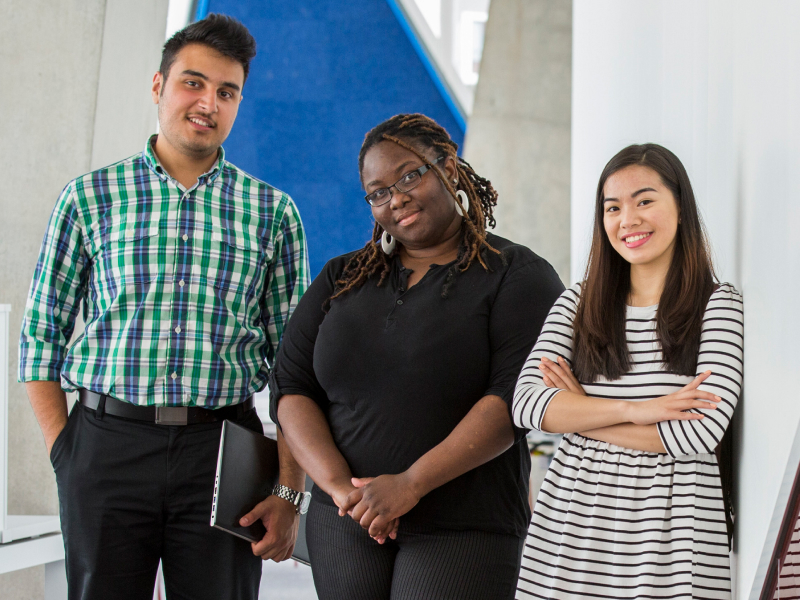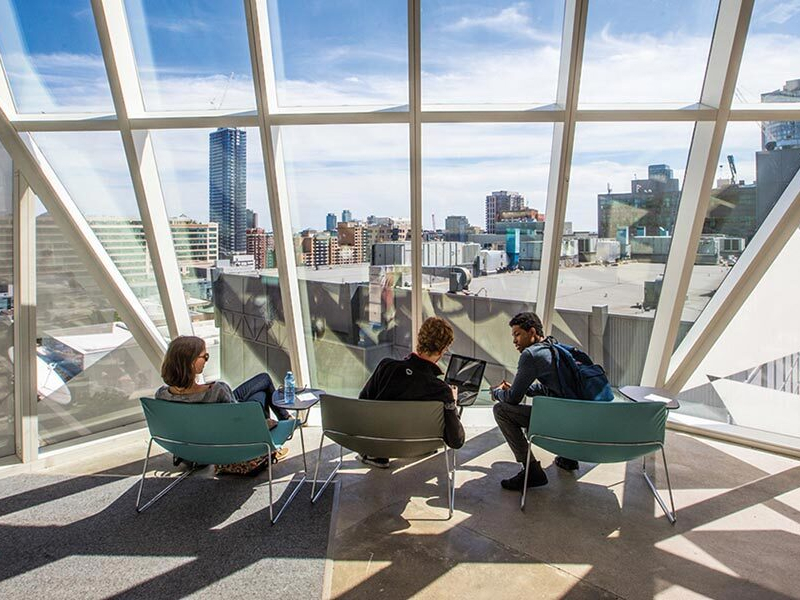Civil Engineering Undergraduate Degree Program
FEAS > Programs > Undergraduate > Civil Engineering
What makes this program different?
Civil engineering students learn to design, manage and maintain safe & efficient infrastructure like highways, buildings, bridges and water treatment facilities – crucial systems that help keep our world running.
Degree
Bachelor of Engineering (BEng)
Department
Civil Engineering
Accreditation
Canadian Engineering Accreditation Board (external link)
Options
FT 4yrs, Co-op 5yrs, + 3 optional specializations
Paid co-op option
Co-op students make an average of $50,000 a year, build professional industry connections with experts (e.g. EllisDon, Toronto Transit Commission, Ontario Ministry of Transportation), and gain on-the-job experience in their future careers.
State-of-the art technology
From wind tunnels to virtual reality environments, our 16 civil engineering laboratories and facilities ensure students can perform sophisticated research and investigation.
Learn about our labs
#1 in Ontario for dedicated & personalized student support
The First Year Engineering Office (FYEO) caters to all first year academic and administrative needs, ensuring a successful transition from high school student to thriving future engineer! First year students also benefit from first year intervention and transition programs that help students maintain and upgrade their academic standing.
Funding for your studies & business ideasExplore scholarships, awards, income opportunities, and financial assistance options to finance your studies. |

Explore your journey
The co-operative (co-op) & internship program offers engineering students 8, 12 & 16 months of paid, full-time on-the-job experience, to develop skills, build professional connections and gain confidence in their chosen discipline.
Specialized structural engineering option equips third and fourth year students with skills in structural analysis, building systems and design of concrete, steel, timber and masonry, as well as bridge design and construction, and renovation/repair of existing structures.
Environmental or Transportation Engineering streams provide fourth-year students the flexibility to choose courses in one of two areas The first area focuses on water and waste management systems that deal with climate change challenges and advancing the circular economy and resource recovery. The second, surrounds the continuously expanding transportation infrastructure, which is evolving to incorporate last-mile transport, public transit innovations, electric and autonomous vehicles, and advanced road materials.
The Optional Specialization in Engineering Innovation & Entrepreneurship (OSEIE) offers business and innovation theory to help students shape ideas, develop technology, and prepare their concepts into marketable ventures.
The Optional Specialization in Management Sciences (OSMS) focuses on engineering and operations management, operations research, finance and organizational behaviour and prepares students for engineering leadership.
The Accelerated Masters of Applied Science Pathway helps research-minded students, who have a minimum CGPA of A-, earn a Master of Applied Sciences up to one year earlier.
A Professional Engineer (P.Eng) License (external link) is an optional professional designation for engineering graduates through Professional Engineers Ontario (PEO).
The first year transition program is designed to help students who may be struggling with the pace of university learning, have missed credits, or need to improve their academic standing. This program ensures that students have the tools and guidance they need to succeed and remain on track in their studies.
This dynamic curriculum fosters skillful, socially and environmentally responsible engineers. Courses in environmental sustainability and civil engineering impact, are coupled with the more technical courses focusing on wastewater management, geomatics measurement, digital mapping & navigation, structural analysis and design, highway design, project management and more.
First & second year engineering students across programs gain multidisciplinary foundational skills in chemistry, writing, calculus, physics, graphics, digital computation and programming, geology, hydraulics engineering economics, material science and more.
By third & fourth year, students gain a sense of their areas of interest and have the options to pursue the specialization option in structural engineering, work and study through co-op or continue with the regular program. All students are required to study law & ethics, project management and environmental impact assessment, and take the Capstone design project course in their final year. Full course descriptions are available on the undergraduate calendar.

“This is an exciting time to be a civil engineer. The challenges we face as a society require bold thinking and progressive practices. Through coursework, labs, clubs, societies, student competitions and optional internship program, this program puts you in the arena of social change.”

Get involved!
Engineering students can join student government, groups & competitions to create meaningful relationships with alumni and industry, deepen their applied knowledge of engineering, and meet new people.

Get help!
Program-specific, career development, personal counselling and more, TMU is #1 in Ontario for providing support throughout your student journey.

Clusters & zones
Students and faculty tackle real-world problems through our four zones and six centres by joining forces with leading organizations, from industry and hospitals to community and government. Our students receive one-on-one mentorship from multidisciplinary experts, and use state-of-the-art technologies that ignite and nurture their start-ups from the ground up.

What does a civil engineering graduate do?
Career possibilities
Careers for civil engineering graduates can be anything but typical. Graduates are employed by engineering technology and consulting companies, and pursue careers in construction, mining, government agencies and more.
Possible employers:
TMU civil graduates work for a variety of leading companies, in various roles including:
- AECOM
- Dillon Consulting
- EllisDon
- Lafarge Canada
- Metrolinx
- PCL Construction
- +More

Anum Khan
Project Manager, Water/Wastewater, Region of Peel
“During my time in TMU’s Civil Engineering program, I found group work in labs and tutorials to be incredibly fun and engaging. The supportive professors and graduate assistants, and hands-on experience in the water and wastewater labs made my time at TMU both enjoyable and deeply educational. I feel I’ve taken the same skills I learned to the field now!”
Civil Engineering (BEng) ʼ19, (MASc) ʼ21

Anthony Hulbig
Engineering Associate, Ontario Ministry of Transportation
“My passion for sustainable development greatly aligned with the civil engineering curriculum at TMU. The courses cover topics in design, management, and communication, and did a great job of preparing me to kickstart my career in the civil engineering industry.”
Civil Engineering (BEng) ʼ24

Mahsa Khodadadi
Assistant Project Manager, HDR Inc.
“The connections you make here last a lifetime, from classmates who become lifelong friends to professors who remain key members of your network long after graduation. The faculty provides continuous support, constantly propelling you toward success. TMU not only fosters a ‘one team’ spirit but also opens doors to limitless opportunities, empowering you to thrive and reach your full potential. You don’t just earn a degree—you unlock a future rich with boundless possibilities.”
Civil Engineering (BEng) ʼ18, (MEng) ʼ21
$10M for entrance scholarships
We offer more than $10M in academic-based entrance scholarships.
$35k for current students
We also offer more than $35k in civil engineering-specific awards. Look for one of our eight awards on the university’s scholarships and awards platform. (external link, opens in new window)
Earn income & develop career-related skills
Undergraduate research assistantships are available for third year students with a CGPA of 3.0 or more.
The Career Boost program provides jobs to eligible full-time undergraduate students.
Get financial assistance
Get info on government financial aid programs such as OSAP, out-of-province student loans, and U.S. student loans.








